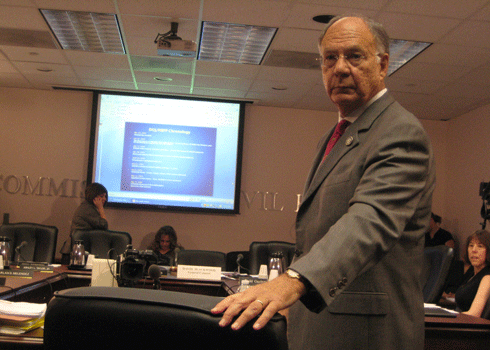The former chief of the Voting Section of the Justice Department’s Civil Rights Division says it was a “travesty on justice” for the DOJ not to allow attorneys to fully pursue a civil case against members of the New Black Panther Party.
Christopher Coates, now an assistant U.S. attorney in South Carolina, testified Friday at the U.S. Commission on Civil Rights hearing on the handling of the New Black Panther Party case. The conservative-dominated commission is preparing a report on how the DOJ handled the case and whether officials pursue the race-neutral enforcement of voting laws.
In his prepared testimony, Coates says there is a “hostility in the Civil Rights Division (CRD) and Voting Section toward the equal enforcement of some of the federal voting laws.”
The country’s major civil rights organizations share that bias against race-neutral enforcement, Coates said.
Coates, who left his position as Voting Section chief in December 2009, said that during the year after the Obama administration took office, he had conflicts with his supervisors, and that his power was “substantially reduced.”
He said he was serving as chief “only in name” and decisions were made by other managers in the Voting Section and Civil Rights Division. “It was a situation where I wasn’t going to be able to manage the division,” Coates said. He talked with Assistant Attorney General Thomas Perez about working out a solution in which he would voluntarily transfer down to the U.S. Attorney’s office in South Carolina.
Coates was chief of the Voting Section when the New Black Panther case was filed in the waning days of the Bush administration.
The Justice Department, which had a representative at the hearing, said in a letter to the commission obtained by Talking Points Memo that Coates was not authorized to speak. DOJ’s Joseph H. Hunt wrote:
As we have previously informed you, Mr. Coates has not been authorized to testify before the Commission. Testimony by Mr. Coates regarding this matter implicates the Department’s longstanding institutional interest in protecting deliberative communications among Department attorneys. Furthermore, we do not believe that Mr. Coates, who has been on detail to the U.S. Attorney’s Office for the District of South Carolina since January 2010, is an appropriate witness to discuss the Civil Rights Division’s current enforcement policies.
Coates said he had a moral, professional, ethical and legal obligation to testify because he believed the commission was given inaccurate representation of the problems regarding race-neutral enforcement of the Voting Rights Act. Those problems, he said, “were manifested in the DOJ’s disposition of the NBPP case.”
Fearing that there might be repercussions for his testimony Coates claimed the protections of all applicable federal whistleblower statutes.
Commissioner Peter Kirsanow, a conservative on the panel, said Coates’ statement was the most profound testimony he had heard in the history of the commission.
Coates was put in place back in 2008 during the Bush administration under Attorney General Michael Mukasey. He replaced the former chief, John Tanner, who resigned after making controversial comments that voter ID laws primarily affected white people because the elderly often don’t have identification and that “minorities don’t become elderly the way white people do: They die first.”
Coates apparently underwent an ideological conversion after an African-American woman was chosen over him as a deputy section chief in July of 2000, according to an article in American Prospect, and became an ally of Bradley Schlozman, who was found to have politicized the division.
The Black Panther hearing has brought out former DOJ official Hans von Spakovsky as well as J. Christian Adams, lawyer who worked on the case and later resigned over the way it was handled.
This is the most coverage the Civil Rights Commission has gotten in a long time, there’s a variety of reporters in the audience as well both television cameras C-SPAN is streaming it live. That’s what Republican Commissioner Abigail Thernstrom, who has dissented from her conservative colleagues on the matter, said the majority of the commission was going for all along.
“This doesn’t have to do with the Black Panthers; this has to do with their fantasies about how they could use this issue to topple the [Obama] administration,” Thernstrom said in an interview with Politico.
“My fellow conservatives on the commission had this wild notion they could bring Eric Holder down and really damage the president,” said Thernstrom. She wrote in the National Review that the case was “small potatoes.”
Late Update: Coates said that for liberals to criticize Schlozman for politicizing the Civil Rights Division is like Snooki from the show Jersey Shore criticizing Lady Gaga for dressing too provocatively.
He said that Schlozman, who he considered a friend, came to a division that was “almost totally left liberal” and that he made some concerted effort to “diversify the division” by hiring conservatives. Coates also said he considered Spakovsky a friend.
Later Update: Here’s Coates’ prepared testimony.
Late, Late Update: The hearing wrapped and spokeswoman told TPM the commission would be delaying the final approval of their 2010 enforcement report.






